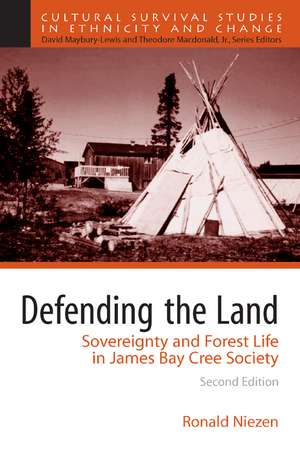Defending the Land: Sovereignty and Forest Life in James Bay Cree Society
Autor Ronald Niezenen Limba Engleză Paperback – 7 aug 2008
The campaign of the Cree people to protect their forest culture from the impact of hydro-electric development in northern Quebec has been widely-documented. Few have heard in any detail about this campaign's outcome and impact upon indigenous societies' futures. This text gives equal attention to the Cree leadership's successful strategies for dealing with major social and environmental pressures with the forces of acculturation and native communities' social destruction.
The titles in the Cultural Survival Studies in Ethnicity and Change series, edited by David Maybury-Lewis and Theodore Macdonald, Jr. of Cultural Survival, Inc., Harvard University, focus on key issues affecting indigenous and ethnic groups worldwide. Each ethnography builds on introductory material by going further in-depth and allowing students to explore, virtually first-hand, a particular issue and its impact on a culture.
Preț: 379.09 lei
Nou
Puncte Express: 569
Preț estimativ în valută:
72.54€ • 75.93$ • 60.38£
72.54€ • 75.93$ • 60.38£
Carte tipărită la comandă
Livrare economică 31 martie-14 aprilie
Preluare comenzi: 021 569.72.76
Specificații
ISBN-13: 9780205651085
ISBN-10: 0205651089
Pagini: 136
Dimensiuni: 152 x 229 x 10 mm
Greutate: 0.2 kg
Ediția:2Nouă
Editura: Taylor & Francis
Colecția Routledge
Locul publicării:Oxford, United Kingdom
ISBN-10: 0205651089
Pagini: 136
Dimensiuni: 152 x 229 x 10 mm
Greutate: 0.2 kg
Ediția:2Nouă
Editura: Taylor & Francis
Colecția Routledge
Locul publicării:Oxford, United Kingdom
Public țintă
UndergraduateCuprins
Preface to the Series
Preface to the Second Edition
1. Introduction.
2. Living on the Land.
“Ownership” of the Land.
Seasons on the Land.
Forest Spirituality.
Healing.
3. The Origins of a Dual Lifestyle.
The Fur Trade.
Missions, Medicine, and Residential Education.
Federal Intervention.
4. Negotiated Transformations.
Hydro-Electricity and the Goals of Extractive Industry.
The James Bay Agreement.
5. Crisis and Accommodation.
The Social Aftermath.
The Pursuit of Health Care Autonomy.
Redefining Education.
Accommodation.
6. Struggles over Sovereignty.
The James Bay Project Revisited.
Two Sovereignties.
The Spoilers.
7. Conclusion.
8. Epilogue
References
Preface to the Second Edition
1. Introduction.
2. Living on the Land.
“Ownership” of the Land.
Seasons on the Land.
Forest Spirituality.
Healing.
3. The Origins of a Dual Lifestyle.
The Fur Trade.
Missions, Medicine, and Residential Education.
Federal Intervention.
4. Negotiated Transformations.
Hydro-Electricity and the Goals of Extractive Industry.
The James Bay Agreement.
5. Crisis and Accommodation.
The Social Aftermath.
The Pursuit of Health Care Autonomy.
Redefining Education.
Accommodation.
6. Struggles over Sovereignty.
The James Bay Project Revisited.
Two Sovereignties.
The Spoilers.
7. Conclusion.
8. Epilogue
References
Notă biografică
Ronald Niezen is Professor of Anthropology at McGill University. His research interested include political/legal anthropology, indigenous peoples and human rights, the social study of new media, history of anthropology/social theory, and social change in Africa.
Descriere
Suitable for both introductory anthropology and upper-division courses in cultural anthropology
The campaign of the Cree people to protect their forest culture from the impact of hydro-electric development in northern Quebec has been widely-documented. Few have heard in any detail about this campaign's outcome and impact upon indigenous societies' futures. This text gives equal attention to the Cree leadership's successful strategies for dealing with major social and environmental pressures with the forces of acculturation and native communities' social destruction.
The titles in the Cultural Survival Studies in Ethnicity and Change series, edited by David Maybury-Lewis and Theodore Macdonald, Jr. of Cultural Survival, Inc., Harvard University, focus on key issues affecting indigenous and ethnic groups worldwide. Each ethnography builds on introductory material by going further in-depth and allowing students to explore, virtually first-hand, a particular issue and its impact on a culture.
The campaign of the Cree people to protect their forest culture from the impact of hydro-electric development in northern Quebec has been widely-documented. Few have heard in any detail about this campaign's outcome and impact upon indigenous societies' futures. This text gives equal attention to the Cree leadership's successful strategies for dealing with major social and environmental pressures with the forces of acculturation and native communities' social destruction.
The titles in the Cultural Survival Studies in Ethnicity and Change series, edited by David Maybury-Lewis and Theodore Macdonald, Jr. of Cultural Survival, Inc., Harvard University, focus on key issues affecting indigenous and ethnic groups worldwide. Each ethnography builds on introductory material by going further in-depth and allowing students to explore, virtually first-hand, a particular issue and its impact on a culture.












